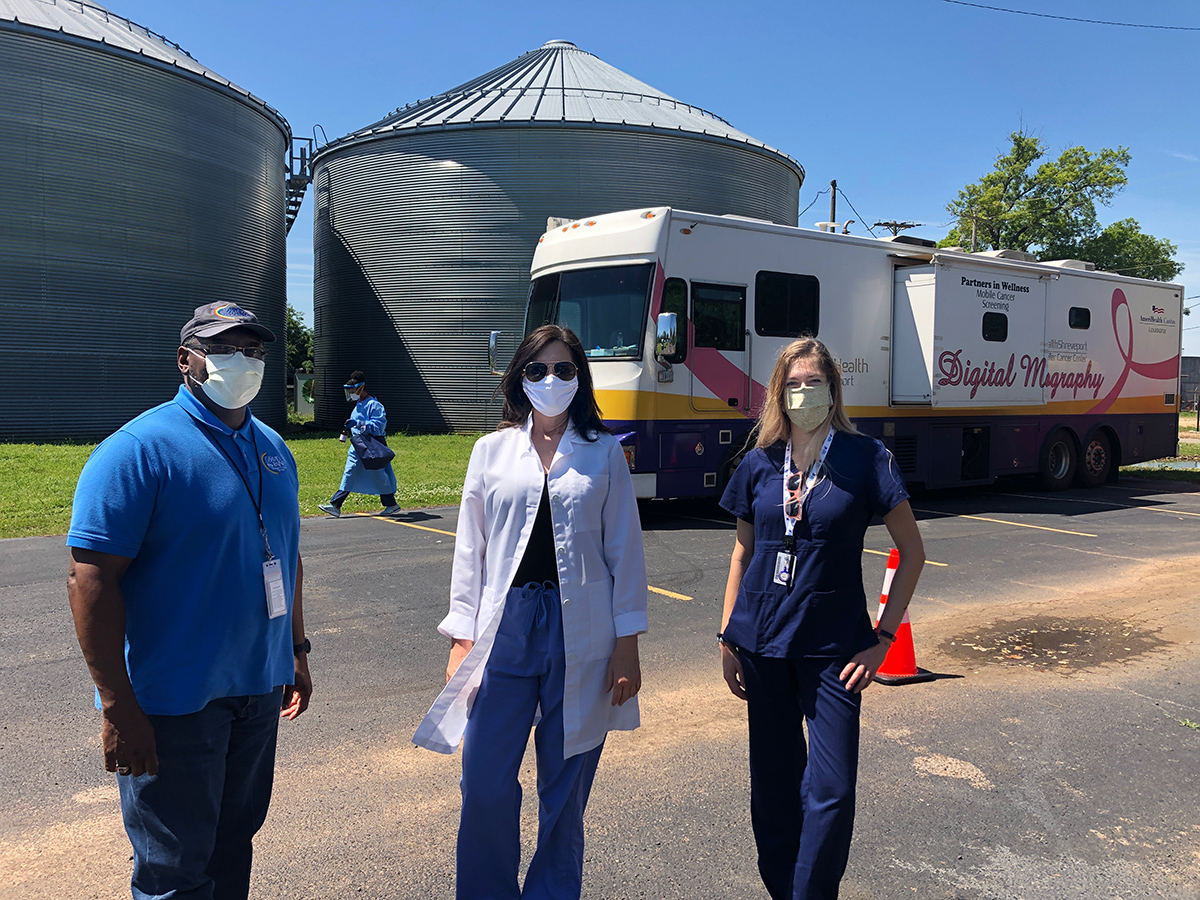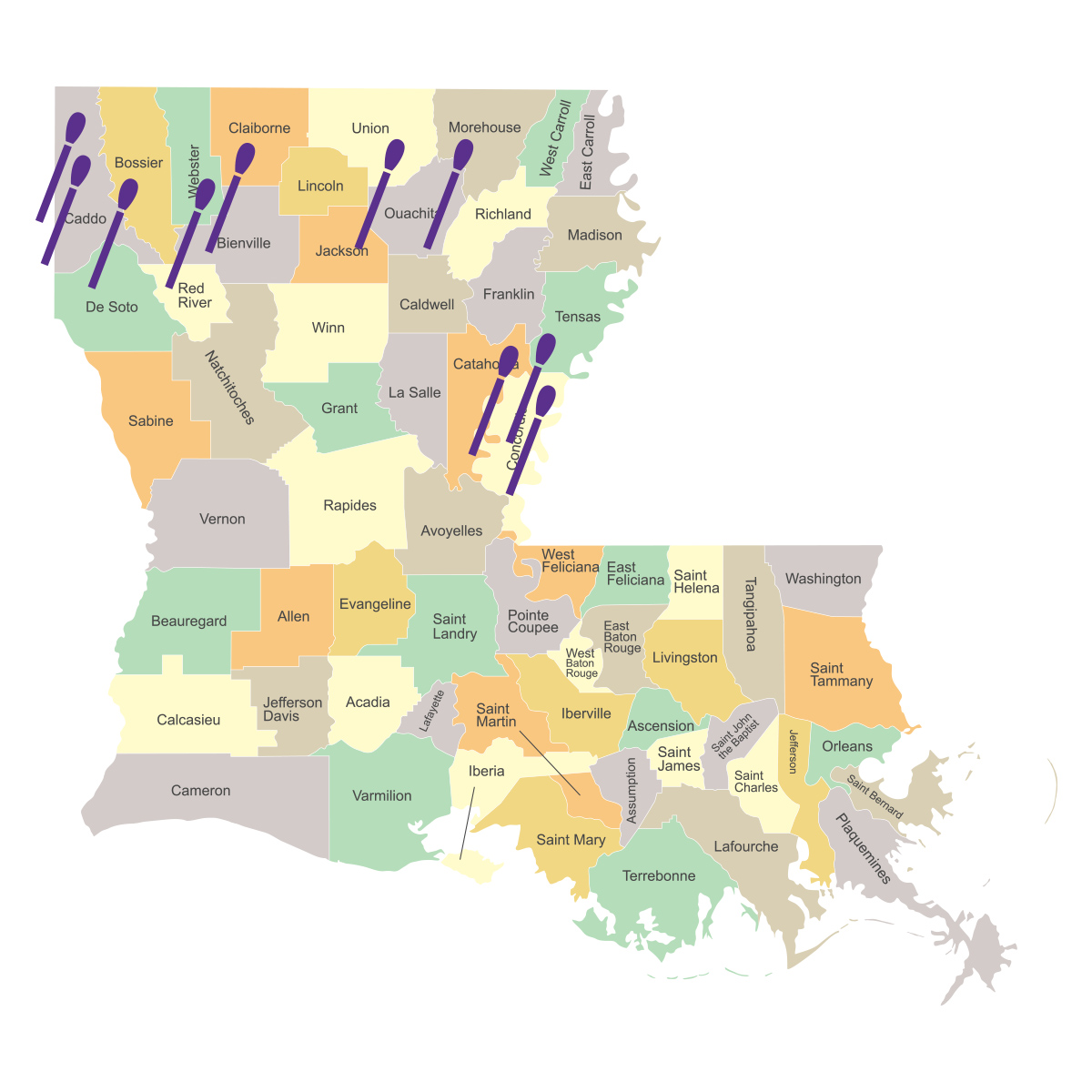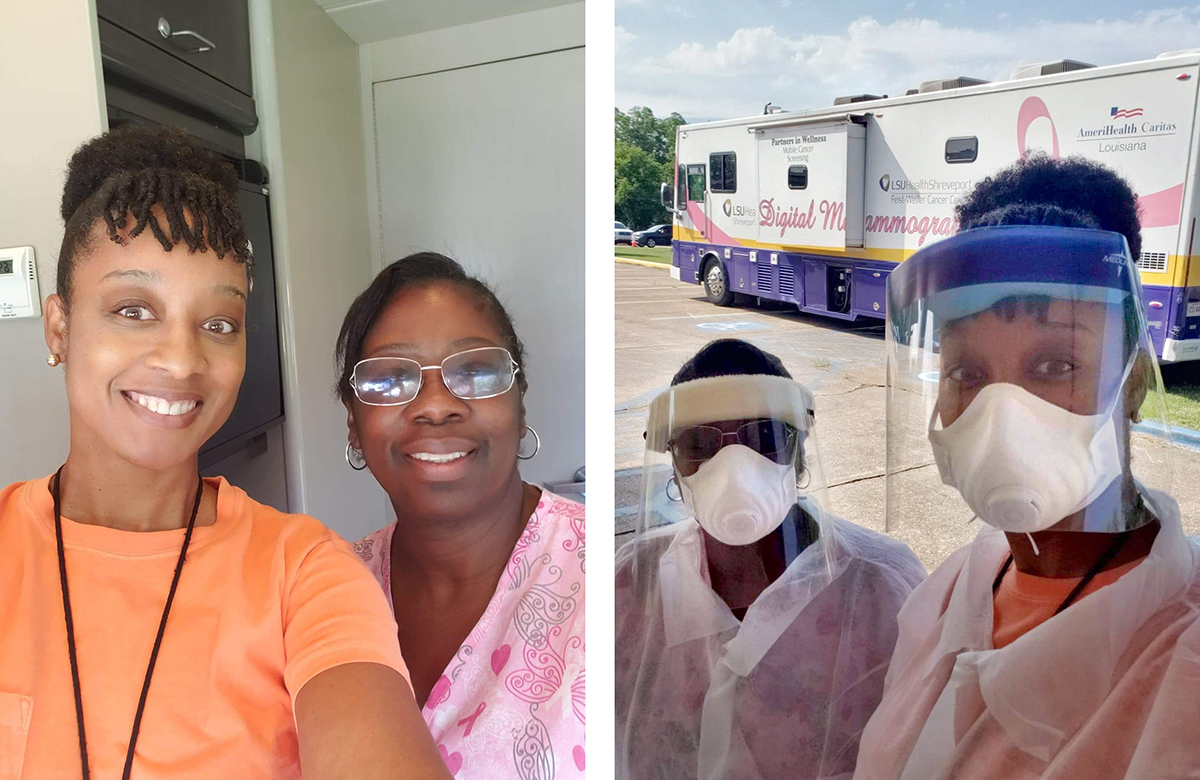On the Road with the LSU Health Shreveport Mobile Testing Unit for COVID-19
May 21, 2020
Since late April, mobile COVID-19 testing vans have been going back and forth from the Emerging Viral Threat (EVT) Lab at LSU Health Shreveport to small towns and rural parishes all across northern Louisiana. They have visited over a dozen locations, sometimes multiple times, and made it possible for more than 1,500 residents in medically underserved areas to receive free COVID-19 testing.
06/05/20 Update: The mobile effort has provided test results to more than 1,800 residents and expanded its reach to several new locations in Caddo Parish and beyond.

Left to right: Willie White, III, CEO, David Raines Community Health Center; Dr. Jennifer Singh and Megan McDaniel of Partners in Wellness at a mobile testing location in Gilliam, Louisiana. Grain silos in the background.
Our efforts are strategically focused to address COVID-19 disparities,” said Jennifer Singh, MD, associate professor of medicine at LSU Health Shreveport, and medical director of Partners in Wellness. “The communities we’ve been going to are generally underserved, and we know African Americans are suffering at disproportionate rates from COVID-19 as far as outcomes. Our mobile testing effort is an attempt to get ahead of that and specifically focus on the communities we know struggle with transportation or access and might not have a primary care provider.”
The Centers for Disease Control and Prevention recently relaxed their criteria for whom can be tested for COVID-19. The guidelines now include “persons without symptoms who are prioritized by health departments or clinicians for any reason, including but not limited to simple public health monitoring, sentinel surveillance, or screening of other asymptomatic people according to state and local plans.”
“This really opened it up,” said Singh. “We want to take care of our communities and with the EVT Lab, we have the resources to do so. The number of patients coming to our mobile testing events has increased exponentially. By the time the gates open we might have 20-30 cars lined up down the street.”
The mobile testing effort out of Shreveport would not have been possible without the EVT Lab. While many people in Louisiana are medically qualified to perform a COVID-19 test, testing kits have been in short supply. Doctors and scientists at the EVT Lab in Shreveport are able to make their own kits.
“The EVT Lab is our trump card,” said Singh. “We have adequately trained health professionals in hundreds of places all over Louisiana, including in rural areas, but what they can’t get their hands on is kits.”

The mobile testing unit out of LSU Health Shreveport and the Emerging Viral Threat (EVT) Lab has traveled all across northern Louisiana as far as Tensas Parish and Concordia Parish on the Mississippi state line. Last week, they added a testing location in Catahoula Parish.
“The Emerging Viral Threat Lab is vital in the diagnosis of COVID-19 based on the accuracy of the results, the capacity to provide those results in 24-48 hours, and to produce tests kits,” said G. E. Ghali, MD, FACS, FRCS (Ed), and chancellor of LSU Health Shreveport. “This lab will continue to play an integral role in the reopening of society.”
Besides the EVT Lab, the mobile testing effort has another asset—infrastructure. Over the past 10 years, Partners in Wellness has operated as a cancer outreach and cancer screening program, bringing mammograms, pelvic exams, and lung cancer screenings to 22 different parishes in northern Louisiana by partnering with local health providers. As the medical director for Partners in Wellness, Singh, together with LSU Health Shreveport leadership, saw early how the pandemic would become a life-changing event. As they already had the expertise, facilities, laboratory equipment, and mobile screening vans, they were able to quickly conceive the Emerging Viral Threat Lab and, subsequently, the mobile testing effort for COVID-19.
“I became involved with our COVID task force early on to collaborate with local officials and try to think about how we could help the community,” Singh recalls. “Rather than sit in Shreveport and have people come to us, why not go into the communities and rural areas to help people get tested?”
In order to be screened at one of the mobile events, patients must first register with a local health clinic that takes responsibility for them—even if it’s just for the day. The local provider also makes sure each patient gets their test results.
“There are those who show up and say, ‘I don’t have a doctor, I don’t have anywhere to go to get tested,’” Singh said. “It’s been very encouraging to me that over 95 percent of those who come are already wearing a mask. Clearly, people are following public safety recommendations.”

Team members Misty Prince and Tracy Norwood (in glasses) before work and during a shift, in full personal protective equipment. The mobile health vans that normally bring mammograms to women in underserved rural parishes were repurposed for coronavirus testing (thus the pink ribbons on the vans).
“You might have a van with five people in it, including children, and then four to six of our swabbers in full personal protective equipment swarming around it to get everyone tested,” Singh continued. “The patients stay in their cars the whole time, but we take walk-ups, too, and always have a place for that, but they’re rare.”
Team members Misty Prince and Tracy Norwood have been to almost every testing location and continue to administer COVID-19 tests.
“People are so appreciative of us coming out into an area that’s convenient to them, familiar to them,” remarked Norwood. “One person will come, and then we often see vanloads and carloads of their family coming back.”
“People ask, ‘When are you coming back?’” Prince continued. “It feels so good to provide this service. A lot of people don’t think the virus is real, because they can’t see it, but we make it real. People learn they could be asymptomatic and still spread it to others.”
“Yes,” Norwood agreed. “Don’t wait until it knocks on your door. Find out if you need to be tested.”
If you’re reading this and have an interest in being tested for COVID-19, call 211.